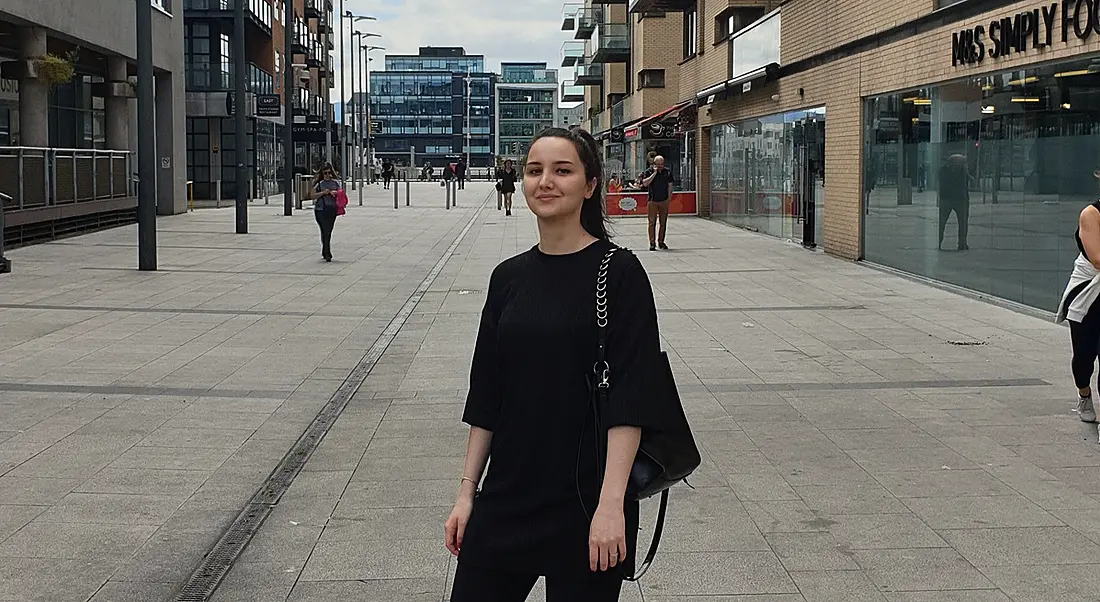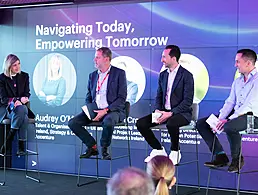Iva Simon Bubalo talks about her career path to date, from studying philosophy to wanting to build tech solutions.
Iva Simon Bubalo is about to start studying AI, but took a very winding path to get there. While she is currently working as an analyst in the technology sector in Dublin, she started out studying philosophy eight years ago.
At that point, Simon Bubalo was curious about the human mind, she tells me, and how certain ideas – such as justice, fairness and freedom – influenced the course of history.
“I vividly remember one of the first Introduction to Philosophy classes where the professor asked: ‘So, you want to become professional thinkers? Why?’
“The room was suddenly filled with differences between the status-quo and what things ought to be, different value systems, ethical considerations of right and wrong, talented beginner impact assessments and the efforts to identify what is essential,” she says. “In order to be able to do those things effectively, our minds needed to train rigorously in one specific tool, and that was logic.”
Simon Bubalo now has a master’s degree in philosophy and language studies, but her next step will see her take part in the master’s course in computer science and AI at NUI Galway.
Philosophy and AI
So, how does philosophy compare to the world of tech and AI? According to Simon Bubalo, there are “a lot of touch points” between the two, particularly around how the human mind and reasoning work. The key, she says, is that philosophical thinking “brings disruption”.
“Philosophy is a unique primer for analytics, project and stakeholder management,” she explains, as it involves an understanding of human rationale, development cycles, and identifying needs and wants.
“Being able to ask the right questions, form the right hypotheses, consider the problem from multiple angles, identify the root cause, lead or follow the argument and instil a sense of purpose in the group are all soft skills valuable in any business setting,” she says.
‘When we do these workshops and design-thinking sessions, I realise that this is a skill that I am familiar with from my from my humanities background’
– IVA SIMON BUBALO
She also saw parallels between the two fields in terms of exploring basic elements of reasoning, decision making and problem solving.
“How to formalise a thought, structural relationships between concepts, assumptions and implicatures in human language, and creating a general world view for machines seemed to be a common and very fertile ground for collaboration between the two disciplines,” she says.
“In AI, we still don’t have a solid, unified definition of intelligence, while we’re working with this notion every day of its development. That’s what drew me to the field initially, but I also saw that there are common areas.”
The role of logic
When she first began working in tech, Simon Bubalo was surprised by how much her background in logic helped.
“[It] helped me to understand, for example, database design,” she says. “I was properly surprised at how much the two areas are linked, where you have to kind of understand relational models and things like that.”
She was also surprised by the relevance of critical thinking and design thinking – the kind of soft skills that “you really developed studying philosophy”.
“I managed to find a lot of use cases also for stakeholder management when we were taking requirements from a stakeholder trying to understand how to build a product or report best, according to their needs,” she explains.
“And when we do these workshops and design-thinking sessions, I realise that this is a skill that I am familiar with from my from my humanities background. To actually understand human needs and wants is basically what philosophy has been studying.”
Making the move to tech
But why did Simon Bubalo move from philosophy to the field of technology in the first place?
“The building aspect drew me to it,” she says. “I wanted to build something in philosophy. You know, it’s a theoretical discipline and it’s very rigorous, but it is building – it’s building culture, it’s building societies, it’s building what I think the product of humanity is: our mentality.
“So what actually drew me to technology was that element of problem solving and its application in the world. Building some products that solve societal issues.”
She says that making the leap from philosophy to technology was scary at the beginning, as she took on a course in data analytics while also working the field. “But I’m just kind of a nerdy person. So I was really excited, too,” she adds.
“I suppose you have a lot of pressure if you’re running projects at work and you have deadlines, but you also have deadlines for college. It can get difficult. It’s really important to have support in this case, such as taking days for study leave and getting exposure to people who are already in the analytics field.
“I can imagine if I didn’t have that kind of support, it would have been very difficult.”
Women in AI
As a woman in technology, especially one who started out in a non-STEM field, Simon Bubalo says that her support network at Women in AI Ireland has been critical.
“Joining Women in AI Ireland was pivotal in a sense that I was suddenly exposed to so many learning opportunities and empowered to follow my path to specialise in AI technology,” she says. “That feeling is truly empowering.”
The group launched last year with the goal of increasing the number of women in AI. It’s led by Alessandra Sala, who is the head of analytics research at Nokia Bell Labs. After attending her first Women in AI event, Simon Bubalo joined as a committee member and contributed to organising the next event.
“In the future, I wish to see more women from all different backgrounds, especially humanities and social sciences, and underrepresented minorities find their place in Ireland’s data science and AI ecosystem.”
‘Anchor yourself to something you know’
Simon Bubalo finishes up our conversation with some advice for people thinking about making a big career pivot.
“In almost every area, I would say it’s a matter of being explicit about where you want to go and what you want to do. After that, I find that people are very supportive. I think at the beginning of your career, that’s extremely important, to be able to show your curiosity and have people respond and support you.”
And for anyone hoping to move into the field of AI – especially women – she adds: “I would advise people to anchor themselves to something that they know, because AI is a highly interdisciplinary field and I feel like people from all different sorts of backgrounds can find something that’s related, whether it’s psychology, agriculture or marketing. I feel like it’s a technology that’s starting to be applied everywhere.
“Also, get to know the ecosystem. It’s important to have exposure, because you don’t know what you don’t know. The people around you who are far ahead in the industry can give you guidance.
“Having that support of the community is really, really empowering. Having the support of the community of women while being in this tech industry is very empowering. And, you know, I have confidence that if I can’t solve something, I know a place where I can go and ask.”




